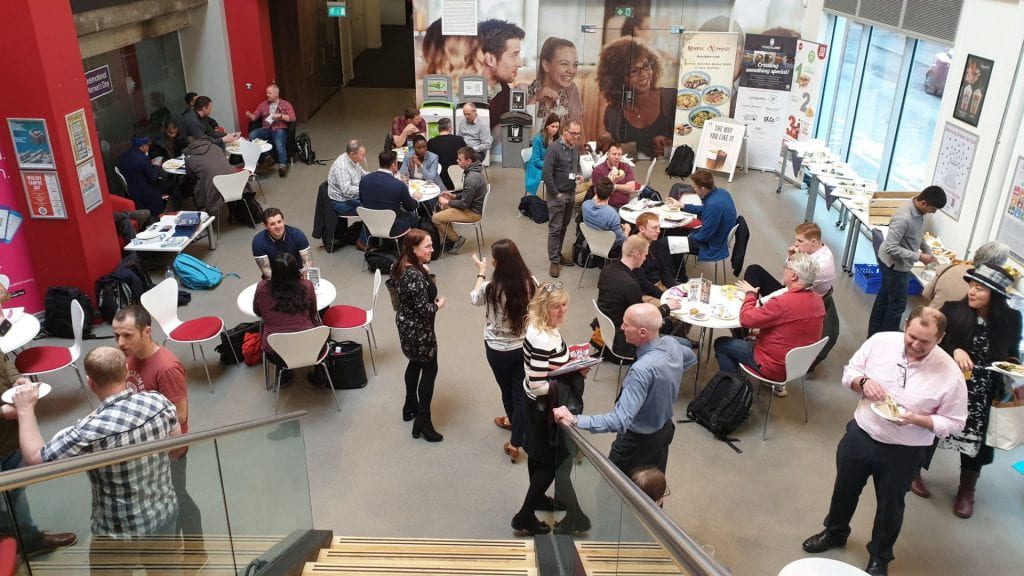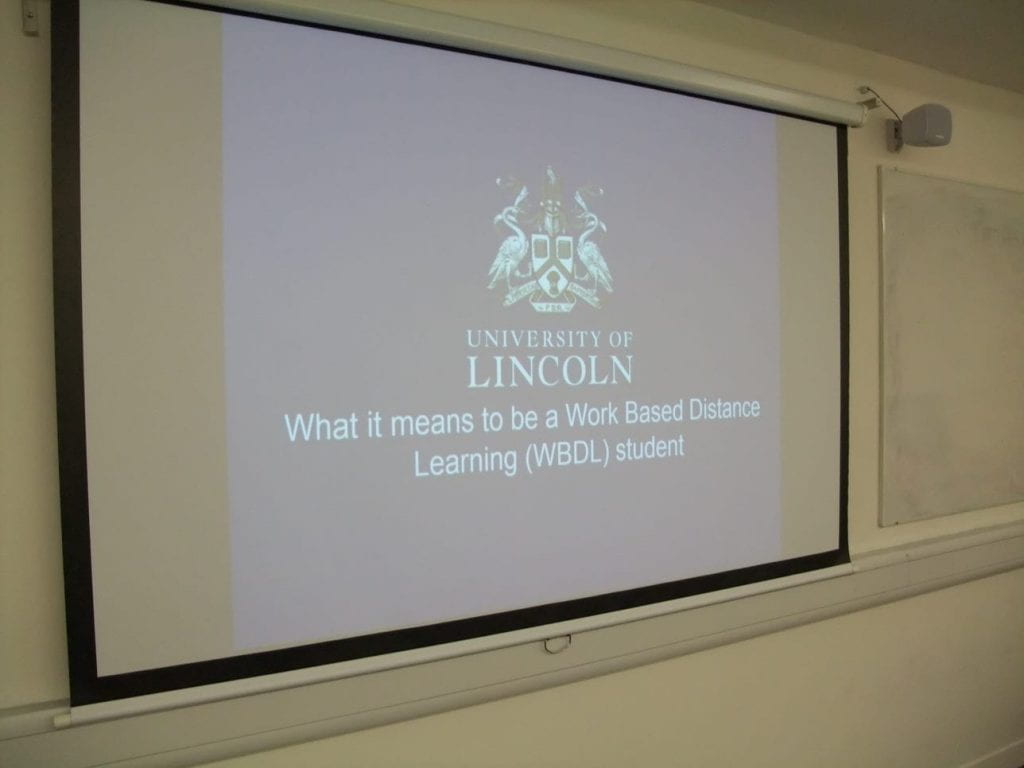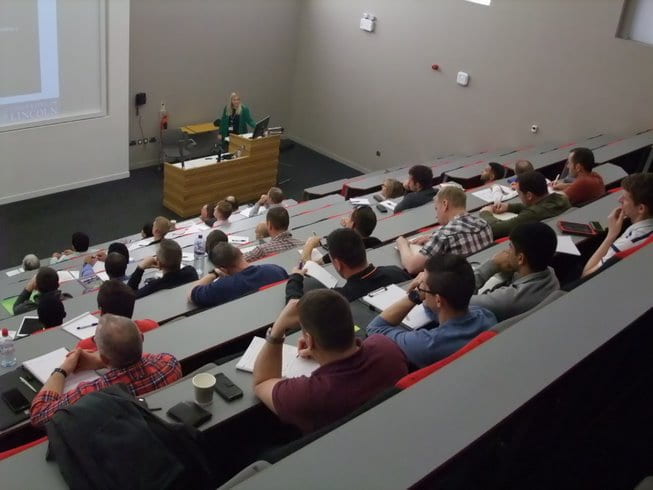Article by Tracy Lamping & Olanrewaju Olaoye
The Work Based Distance Learning (WBDL) team welcome three new cohorts each academic year: in October, March and May/June, employing a 10 week module delivery structure. All WBDL students are mature and in full time work, equipped with previous qualifications and management experience: they enrol on the final year, seeking a “top up” degree to enhance their careers. So WBDL students are not typical undergraduates, and whilst they join us with a range of expectations, aspirations and hopes, they invariably also have fears and anxieties, concerned whether they will be able to cope not only with level of work, but the workload on top of a full time job and other commitments.
By providing students with an appropriate and comprehensive Induction Programme, it is hoped that such anxieties and concerns are alleviated. Furthermore, the Induction Programme prepares students for the challenges and adventures that lie ahead by introducing modules, addressing academic skills, and outlining teaching/learning strategies and approaches adopted in higher education to enable each student to co-produce knowledge with their peers during the course of the modules constituting the programme. The co-production of knowledge is enabled by the use of Blackboard Collaborate Ultra for synchronous sessions/workshops and the Discussion Board for the analysis of real life problems. Thus, the philosophy of ‘Student as Producer’ for WBDL students refers to the objects, resources and processes that students create in order to determine solutions to work-based problems (The University of Lincoln’s ‘Student As Producer’ User Guide, 2010-2011, 3).
An Induction Handbook and welcome pack distributed prior to the commencement of studies forms the first part of the induction process. The Induction Handbook clearly details things students need to know before embarking on their academic journey, but also acts as a useful reference point throughout their Degree.
As our WBDL students live and study all over the world, Blackboard Collaborate Ultra successfully facilitates the on-line induction programme. This allow tutors to create a social context for learning, thereby supporting the arguments of Vygotsky (1997) linked to the need for the tutor to create a context for the co-production of knowledge between students and tutors. The Induction Programme starts in Week 0, presenting students with information about their chosen Degree, as well as the opportunity to meet some of the WBDL team and interact with students they will be studying with. The sessions run Monday to Friday at 6.30pm and, despite many different time zones, are very well attended with an average of about 50 attendees per session from the last 5 cohorts; sessions are recorded for those unable to attend the ‘live’ sessions. Evidence demonstrating the use of the recording of the sessions is presented within Figure 1 below

The Induction Programme concludes with an on-campus induction day which proves extremely successful, with over 100 attendees travelling from far and wide to
Whilst the morning session focuses on the student’s degree, the first module, Blackboard and a session on critical writing, the afternoon session involves students working in small groups, engaging in a Library task which aims to develop their research and referencing skills – competitiveness is very much in evidence following the announcement that there are prizes for the winning team! Please see Figure 2 below demonstrating students working on a library task.

The Students’ Union attend to facilitate the nomination and election of Course Representatives.
Thus, the Induction Programme prepares students for their academic studies by encompassing a number of aspects including: task induction, whereby the requirements of the first module are introduced; system induction, focusing on how to approach things from a distance learning perspective, including accessing and using the Library; and a social induction, to encourage interaction with other students, thereby avoiding the feelings of isolation that distance learning can bring – as a result, students often set up groups using Facebook, WhatsApp etc to establish and maintain contact and support with their peers. The on-campus induction offers a degree of geographical induction, ensuring familiarity with the Lincoln International Business School, Blackboard, the IT network of the University and the Library.
Induction is seen as being holistically linked to the student life-cycle, and integrated with the curriculum, with each module offering regular on-line contact with the module tutor and other students. Students are encouraged to interact and work with their peers: for example, the first module, Critical Enquiry Skills, involves peer assessment of an individual activity, which proves particularly successful in facilitating perception of the student’s document from different perspectives and thereby encourages reflection and personal development. Evidence gathered from the reflection provided by students at the end of the first module suggests that the WBDL induction system and strong teaching teams are vital in supporting students studying on-line at a distance, confirmed by a student who states:
“The CES module has allowed me to identify my weakness in learning and the importance for critical reflection to identify wider considerations and alternative viewpoints. This learning experience has helped me identify the argument within my reading, but also to better deliver my line of argument through my critical writing. Continuing forward with the rest of my studies, I believe I will be more observant in my reading, have increased confidence to be critical of information and feel better prepared to apply these new skills into my future academic work.” (Mallinson, 2019).
As induction is a continuous process, a dedicated programme of events is offered for continuing students at the on-campus Induction Day. The first session encourages students to reflect on their academic journey, whilst the second, “Approaching the Dissertation/
Independent Research Project” prepares students for their final module and another, “Critical Reading for Critical Writing”, helps the enhancement of research and writing skills. Other sessions offered aim to prepare students for life as a graduate, including “Career Progression”, which focuses on Curriculum Vitaes, Interviews, and Assessment Centres, and “Preparing and Delivering Effective Presentations” to help students with both academic or business presentation they may be required to give. Induction is, therefore, seen as being holistically linked to the student life-cycle.
All resources from the Induction Programme are made available on Blackboard to ensure neither students nor tutors are disadvantaged if they are unable to attend in person. The Induction Programme is an integral part of the WBDL journey, and aims to ensure students are suitably equipped with the information, knowledge, skills and abilities they need to be successful in their Degree. To be part of the learning journey of our students, from induction to graduation, is something WBDL tutors cherish: we take immense pride in investing our time, knowledge and skills in the teaching and learning process that seeks to develop students who are not just consumers of knowledge, but more importantly, students who will be producers and trail blazers in various spheres of life. Watch this space!


